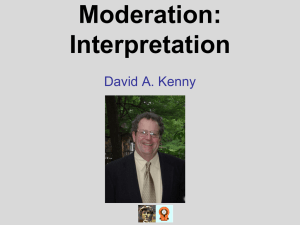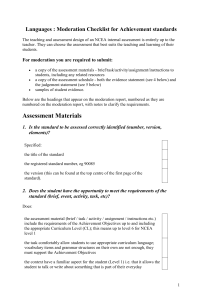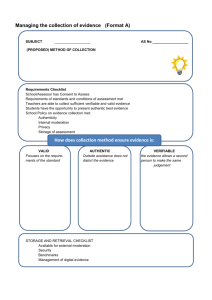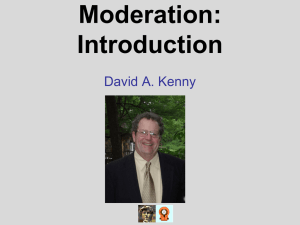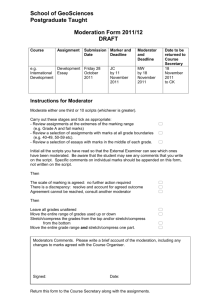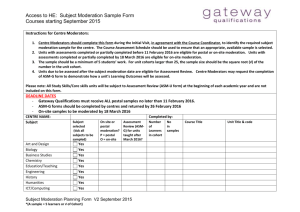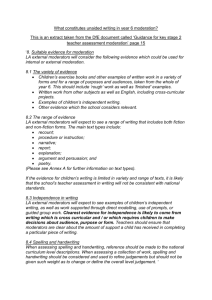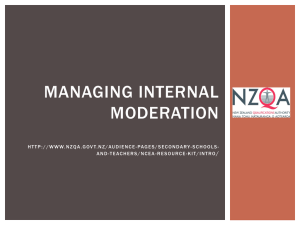HAMKA's Concept of Moderation An Analysis
advertisement
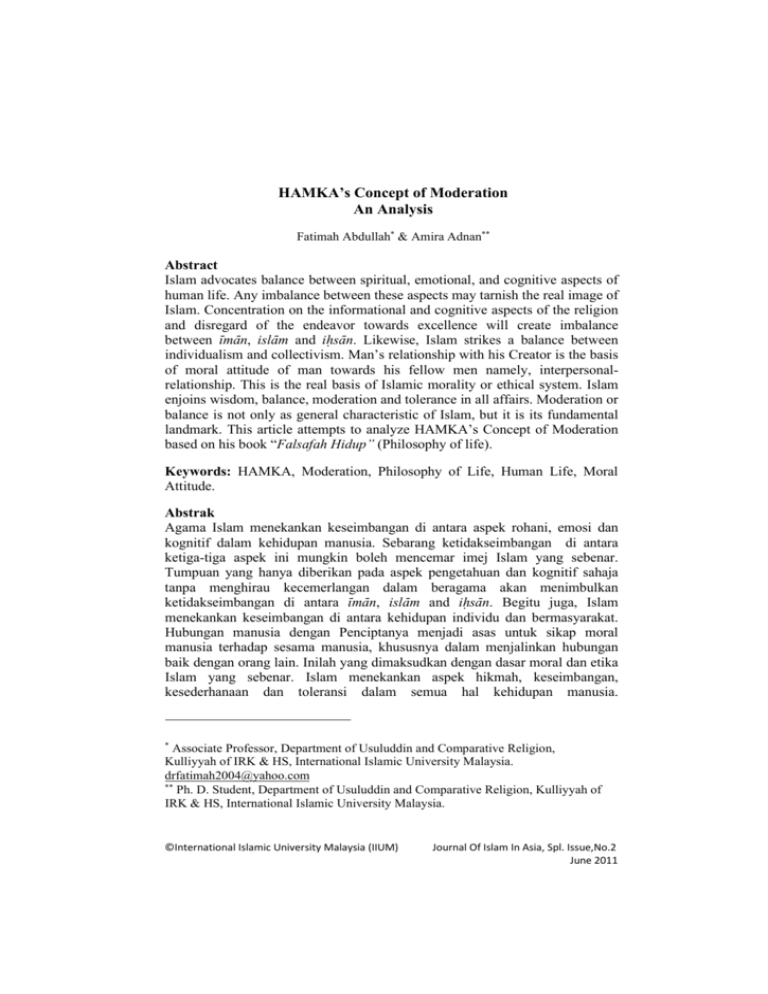
HAMKA’s Concept of Moderation An Analysis Fatimah Abdullah∗ & Amira Adnan∗∗ Abstract Islam advocates balance between spiritual, emotional, and cognitive aspects of human life. Any imbalance between these aspects may tarnish the real image of Islam. Concentration on the informational and cognitive aspects of the religion and disregard of the endeavor towards excellence will create imbalance between ÊmÉn, islÉm and iÍsÉn. Likewise, Islam strikes a balance between individualism and collectivism. Man’s relationship with his Creator is the basis of moral attitude of man towards his fellow men namely, interpersonalrelationship. This is the real basis of Islamic morality or ethical system. Islam enjoins wisdom, balance, moderation and tolerance in all affairs. Moderation or balance is not only as general characteristic of Islam, but it is its fundamental landmark. This article attempts to analyze HAMKA’s Concept of Moderation based on his book “Falsafah Hidup” (Philosophy of life). Keywords: HAMKA, Moderation, Philosophy of Life, Human Life, Moral Attitude. Abstrak Agama Islam menekankan keseimbangan di antara aspek rohani, emosi dan kognitif dalam kehidupan manusia. Sebarang ketidakseimbangan di antara ketiga-tiga aspek ini mungkin boleh mencemar imej Islam yang sebenar. Tumpuan yang hanya diberikan pada aspek pengetahuan dan kognitif sahaja tanpa menghirau kecemerlangan dalam beragama akan menimbulkan ketidakseimbangan di antara ÊmÉn, islÉm and iÍsÉn. Begitu juga, Islam menekankan keseimbangan di antara kehidupan individu dan bermasyarakat. Hubungan manusia dengan Penciptanya menjadi asas untuk sikap moral manusia terhadap sesama manusia, khususnya dalam menjalinkan hubungan baik dengan orang lain. Inilah yang dimaksudkan dengan dasar moral dan etika Islam yang sebenar. Islam menekankan aspek hikmah, keseimbangan, kesederhanaan dan toleransi dalam semua hal kehidupan manusia. ∗ Associate Professor, Department of Usuluddin and Comparative Religion, Kulliyyah of IRK & HS, International Islamic University Malaysia. drfatimah2004@yahoo.com ∗∗ Ph. D. Student, Department of Usuluddin and Comparative Religion, Kulliyyah of IRK & HS, International Islamic University Malaysia. ©International Islamic University Malaysia (IIUM) Journal Of Islam In Asia, Spl. Issue,No.2 June 2011 Fatimah Abdullah & Amira Adnan 358 Kesederhanaan dan keseimbangan bukan sekadar ciri-ciri umum Islam, tetapi kedua ini merupakan mercu tanda yang paling asas. Makalah ini adalah suatu analisi mengenai Konsep Kesederhaan Hidup menurut HAMKA dalam bukunya ‘Falsafah Hidup’ Kata kunci: Hamka, Kesederhanaan, Falsafah Hidup, Kehidupan Manusia, Sikap Moral Introduction The Islamic worldview is essentially a theistic and ethical worldview. Worldly life is perceived in Islam as of dual aspects, dunyÉ and Ékhirah. Although the Qur’Én stresses that the Ékhirah aspect is better than that of the dunyÉ, it does not belittle the latter. On the contrary, dunyÉ is held to be a place of preparation for happiness in the Ékhirah. Islam alone allows man to enjoy his earthly life in full without losing its spiritual orientation. Islam stresses on the necessity of balance between the need of the physical life and that of the spiritual one. Islam stands not for life-denial, but for life-fulfillment. It does not teach man to avoid material things. It holds that spiritual elevation is to be achieved by living piously in the rough and tumble of life and not by renouncing the world. In fact, Islam strikes balance between material, moral, and spiritual dimensions of life. Hence, man is to devote all his energies to the reconstruction of life on healthy moral foundations. This study focuses on the views and explanation of HAMKA. Abdul Malik Karim Amrullah, known as HAMKA was born in West Sumatra February 17, 1908 - and died in Jakarta July 24, 1981. He was a prominent Indonesian author, ÑÉlim and politician. His father, sheikh Abdul Karim Amrullah, known as Haji Rasul, led and inspired the reform movement in Sumatra upon his arrival from the holy land Makkah in 1906. In 1970's, HAMKA was the leader of Majelis Ulama Indonesia, an extra government Muslim organizations in Indonesia which, have power to produce Fatwa, and contains ÑulamÉ and scholar from NaÍÌatul ÑUlamÉ and Muhammadiyah. Understanding Moderation Moderation means the quality of being moderate and avoiding extremes, or to be within limits that are not excessive. Moderation is always considered an excellent and praiseworthy quality. Inherent in the concept of moderation is the idea of “the means” – i.e. the limit to be HAMKA’s Concept of Moderation 359 observed in every conduct for it to be deemed moderate. Moderation is the praiseworthy trait in between two extremes i.e. excess and deficiency like generosity, which is between extravagance and stinginess; and courage, which is between foolhardiness and cowardice.1 In Al-GhazÉlÊ’s view, the mean (wasÏ) is a virtue (faÌÊlah) and the two extremes, excess and deficiency are two vices (radhÊlatÉn). For him, the mean is the straight path (aÎ-ÎirÉÏ al-mustaqÊm) which the Qur’an orders man to follow, but this mean, according to him is extremely difficult to follow. He states that man can approach this path but he cannot reach it. According to him, it is only the Prophet (s.a.w.) who was able to keep to the right mean. He adds that similarly in the hereafter, there will be a bridge-like path (aÎ-ÎirÉÏ) suspended over hell, and all men will have to cross it in order to enter paradise. In proportion to a man’s adherence to the mean in this life, he will be able to walk along the path in the hereafter. Al-GhazÉlÊ emphasizes the importance of the mean by saying that “The ultimate aim in all affairs and character-traits is the mean, since the best in all things is the mean, and both extremes are blameworthy”.2 The Qur’Én emphasizes moderation in many of its verse such as the following; “These are the bounds, the limits set by AllÉh. Do not then transgress them, for who transgress them are evil doers.”3 “And those are the set limits of AllÉh. And whosoever transgresses the set limits of AllÉh, then indeed he has wronged himself.”4 The above Qur’Énic verses explain the limits (hudËd) set by AllÉh with regard to family relationships, especially that which relates to husband and wife. Favoring an individual over another and giving a person more than what he deserves is regarded as transgression in IslÉm. 1 Md Asham Ahmad, Moderation a Virtue of Islam, http://thestar.com.my/ikimviews&file/2010/11/16/ (accessed September 29, 2011). 2 Muhammad Abul Quasem, The Ethics of Al-Ghazali, 80-85. 3 Al-Baqarah: 229. 4 Al-ÙalÉq: 1. 360 Fatimah Abdullah & Amira Adnan Lessening or decreasing the rights of another person is transgression as well. The Prophet (s.a.w.) says: “Verily AllÉh has prescribed the obligatory deeds, so do not neglect them; He has set certain limits, so do not go beyond them; He has forbidden certain things, so do not indulge in them; and He has said nothing about certain things, as an act of mercy to you, not out of forgetfulness, so do not go enquiring into these.”5 HAMKS’s Concept of Moderation HAMKA puts a greater emphasis on the discussion of moderation when he devotes a chapter on moderation in his “Falsafah Hidup”. At the beginning of his discussion, he mentions three groups of people with regard to their desire. First, the one who follows his desire and does not handle it properly until he sacrifices his wealth, his good names, his nation and his country. He neither cares about the rights of others nor does he care about God’s rights. Consequently, his physical and spiritual is destroyed and he lives in humiliation. Second, the one who neglects totally his desires, such as marriage. However, he explains, between the two of them there is the third group who stands in the middle. He does not succumb to his desire but only fulfills it in a lawful manner without excessiveness of any kind. The first two groups were criticized by HAMKA because one is too excessive and the other is too deficient. Both these approaches according to him are dangerous for man. The latter group was praised by HAMKA for being moderate and just.6 According to HAMKA, true Muslims are moderate in religion in the sense that they do not prefer any extreme point either in terms of excess or deficiency. He recommends moderation in the acts of worship such as prayer, fasting, performing pilgrimage as well as all other religious duties. For example, Islam encourages Muslims to perform tahajjud prayer. But this act of worship may miss moderation on the part of the performer. So, there is a need to work and struggle in the name of 5 Jamal Ahmed Badi, Forty AÍÉdith: Commentaries on ImÉm al-NawÉwÊ’s, (Kuala Lumpur: Muazzin Productions Snd Bhd, 2008), 210-211. 6 HAMKA, Falsafah Hidup, Umminda: Jakarta, 1984. 144. HAMKA’s Concept of Moderation 361 AllÉh so as to maintain balance in the act. In fact, preferable deeds are encouraged depending on man’s capacity whenever possible, but what is important is fulfilling obligatory acts. Time spent on worship should neither be so excessive that other work is neglected, nor should it be so little that the obligatory duty is disregarded.7 HAMKA addresses in his writin those who intended to push themselves to the extreme limits in the act of worship. In this regard HAMKA quotes a ÍadÊth about the story of the three persons who headed for the houses of the Prophet (s.a.w.) to enquire about the nature of his acts of worship. When they were informed about the daily routine of the Prophet (s.a.w.), they considered it too little, and said: “We are lagging far behind the Prophet (s.a.w.), he is the one whose previous and potential faults are forgiven”. Accordingly, one of them vowed, “I shall pray night-long forever”; another exclaimd, “I shall fast forever”; while the third said, “I shall do without women; I shall never get married.” Thereupon the Prophet (s.a.w.) stepped in addressing them, “Are you the ones who said so and so… Surely I am the most fearful and pious to AllÉh among you, yet I fast and break fasting, pray and sleep, and marry women. So whoever deviates from my tradition shall not be a follower of mine!”8 By referring to this ÍadÊth, HAMKA explains that some people had decided to fast continuously, to abstain from marriage, to give up eating meat in order to control their lust, or to renounce sleeping on beds as part of their worship. The answer of the Prophet, he further elaborates, shows his advice to those people to adopt a moderate lifestyle and thereby seek to acquire AllÉh’s acceptance. This suggests that a moderate personality, one that Islam seeks to develop, leads one to seek to fulfill the rights of AllÉh and of human beings, including of one’s own self. The Prophet declared, in another ÍadÊth: “Your body also has rights over you. AllÉh also has rights over you. Your guest also has rights over you. Your wife and children also have rights over you. That is why you should fulfill the rights of the AllÉh and the rights of oters.”9 With this understanding, moderation according to HAMKA is justice. What is meant by justice here is to give the right to whom it deserves. In 7 Ibid. 144 Ibid., 145. 9 Ibid. 8 Fatimah Abdullah & Amira Adnan 362 contrast, giving a person more or less than he deserves is regarded as exaggeration in Islam. For HAMKA, moderation also means istiqÉmah (steadfastness). IstiqÉmah means to stand firm and by that, man should not allow himself to follow or to be misled by desires as it will lead him astray and cause him to deviate from the right path. HAMKA adds that man’s actions are to be in line with the way determined by Islam which promotes moderation for the betterment of human being in this world as well as in hereafter.10 HAMKA divides moderation into several types: moderation in terms of man’s intention and mission, thinking, needs, happiness, wealth, name, position and training. Moderation in NÊyyah First category of moderation emphasized by HAMKA is moderation in nÊyyah (intention) and mission. He says that Islam does not emphasize only on good action, but also demands its purpose and motive to be correct. The action is manifested by body, and the correct purpose and motive is within the soul. In fact, there can be numerous purposes and motives for man’s actions, some are positive and some are negative. But the greatest one according to HAMKA is in the middle which is moderate purpose and motive.11 Doing a good deed for the sake of financial or any other personal gain is an act of the lowest moral order. The desire for honor, reputation and fame is also a lowly purpose. However, moderate people may regard the attaining of happiness and AllÉh’s blessing to be the intention and purpose of their deeds.12 In Islam, there is only one purpose and motive for the acts of a Muslim, that is, according to AllÉh’s Will and His pleasure. The intention of a person is the foundation of a righteous or evil act. In fact, the result of a person’s deed cannot be regarded as good or bad without his intention being taken into consideration. According to HAMKA, man’s intention cannot be measured by external but by internal aspect of human being which is within human’s mind and soul. He states that a good person cannot be measured from his external acts. 10 Ibid., 146. Ibid., 147. 12 Ibid. 11 HAMKA’s Concept of Moderation 363 However, being moderate in intention and mission for HAMKA means to have a good intention to do something for the purpose of improving and benefitting the community. It is noteworthy that such actions are done with good nÊyyah, that is, for the sake of AllÉh. If the intention is to gain more money, or to get higher position, it is not considered as moderate, but excessive.13 An example may suffice to bring the point home. Øolat is one of the righteous acts, but if it is performed for the purpose of show, pride, or hypocrisy, then, this act, instead of being a source of reward will become a source of punishment. Another example is that one wants to help the poor with the intention of gaining the praise of others. His act would not be regarded in the sight of Islam as a righteous act worthy of any reward. The Qur’Én states that if the purpose of a deed is only for exhibition and show, its reality is nothing more than a deception.14 AllÉh says: “If any do desire a reward in this life, We shall give it to him; and if any do desire a reward in the Hereafter, We shall give it to him”.15 There are many Prophetic traditions which explain that the reward of a person’s action depends upon his intention. For example, the Prophet is reported to have said; “The rewards of deeds depend upon intention”. Another ÍadÊth that relates to this matter is: “Every person would get the reward according to what he has intended. So whoever emigrated for AllÉh and His messenger, his emigration is for AllÉh and His Apostle, and whoever emigrated for worldly benefit or for a woman to marry, his emigration is for what he migrated.”16 In short, praiseworthy or blameworthy action depends on the intention. Therefore, in a discussion of virtue, intention must be given a proper attention for it is a foundation of good deed. The Prophet says: “Actions are judged by intention (nÊyyah), so man will have what he intended”. It means, man’s actions are determined or undermined by his intention, whether good or bad. Where good intention is lacking, the performer of good deed is not regarded worthy of any praise and is deprived of rewards and AllÉh’s blessing.17 13 Ibid. Ibid. 15 Óli ‘ImrÉn: 145. 16 Jamal Ahmed Badi, Forty AÍÉdith: 20. 17 Ibid. 14 Fatimah Abdullah & Amira Adnan 364 HAMKA emphasizes that the goodness of a deed depends on the intention and purpose. If it is done for the pleasure of AllÉh, it is good and virtuous. If such a deed is for the purpose of satisfying one’s own desire, it is evil. Moderation with the Mind In achieving good intention, man should have good mind that can differentiate between good and wrong. HAMKA discusses the second category of moderation, that is, moderation with the mind. According to him, having moderate mind signifies control over it so as to protect it from any kind of narrow or excessive thinking. Moderate mind can lead a person to attain essence of humanity and the level of nobility. For him, human life will be harmful when his mind is influenced by negative elements. Therefore, the moderate mind is necessary to prevent man from accepting wrong opinions and false ideologies.18 HAMKA promotes a moderate stance in terms of dealing with and using human mind. He states that immoderate use of mind refers to its excessive application as if it is the source of all physical and metaphysical knowledge. Exaggerated role of reason, he laments, has led people to accept whatever the human mind accepts, and to reject what are incomprehensible to the mind. On the contrary, there are people who undermine the ability of the mind, and cling to the supernatural powers and illusions. However, HAMKA rejects both attitudes. He states that man in general cannot grasp beyond the limits of the physical world that belong to the ‘unseen’ and thus beyond human comprehension. He suggests that believers must be aware of the limited powers of their mind and thus, recognize the limited ability of their mind.19 HAMKA explains that moderate mind means its wise use. This, according to him, requires continuous training and effort. Those who are wise think about what he will get in the future, not about the hardship he is facing now as he knows after the hardship there is a relief. He derives lessons from what others have done and takes them as example in his life.20 18 Ibid, 147. Ibid, 148. 20 Ibid, 149. 19 HAMKA’s Concept of Moderation 365 HAMKA states that the world had seen the rapid development of knowledge. However, no matter how it develops it is still unable to reveal the unseen matters as well as to solve the human crisis nowadays. However, HAMKA says that man cannot give up his effort in seeking knowledge and he should continue acquiring it in a moderate way. He quotes a Qur’anic verse: “On no soul doth God place a burden greater than it can bear”.21 HAMKA highlights that from the moderation in mind, man will develop the virtue of being ambitious, tawakkul and good expectation (husnu al-Ðann). Ambitious for HAMKA means a person who has ambition to work harder until he achieves his goal. He also lives in peace and harmony. Ambition is a first step in taking an action. It raises the virtue of hardworking, never loses hope and makes an effort in order to attain it. This can lead to happiness in this world. The ambitions will remain in place as long as man never stops thinking and contemplating. Moderation that leads to good expectation produces peaceful life because a person who has good expectation from others will never have the feeling of envy. Therefore, his good relationship with others can lead to a better life.22 HAMKA claims that when a person becomes proud of the improvements in his life, he loses moderation. He has to, then, eliminate the feeling of pride in order to obtain moderate mind. Pride that should be eliminated according to HAMKA is that of position and lineage which makes man forget to contemplate on his own weaknesses. He thinks that he is better than others and always finds faults with others. He also looks down upon others with contempt. HAMKA suggests selfexamination (muÍÉsabah) and regret in order to get rid of the feeling of pride. HAMKA assures that man would no longer consider himself better than others when he knows his weaknesses.23 HAMKA further elaborates that moderate mind can be expressed through speech and writing. He says that man tends to express his thought in speech and writing. He writes so that his ideas and thoughts will benefit his community. As for speech, man must be aware that speech is a source of many problems. Sages (ÍukamÉ’) advise: “In 21 Al-Baqarah: 225. HAMKA, Falsafah Hidup, 152. 23 Ibid., 148. 22 366 Fatimah Abdullah & Amira Adnan principle, keep silent, unless you have to speak”; also “Silence, where there is no possibility of lewd speech, is better than speech with (the likelihood) of error”.24 In general, speech has a didactic purpose. It must be used in moderate way, for example, to counsel others to amend their wrongs. However, it can be used abusively to cause grief and pain by insults, backbiting and slander. The immoderate man who seeks immediate gratification, or to satisfy position or power, is bound to use his tongue destructively.25 Writing is very important for people to get the lesson and information. HAMKA is of the view that there are people who deny his stands or opinions and do not want to listen what he was talking about, but they will read what he writes, because they cannot hinder his writings.26 He adds that speech is for listening which man can easily forget. However, it would not be the same for writing. Writing is for man to think, because if man cannot understand what he reads, he can read it several times until he understands.27 HAMKA stresses moderateness in expressing the ideas, either in speech or in writing. Man has to write what he knows and do not copy from others without permission for according to him, it is a form of plagiarism. He states that man has to be true to himself and make certain that his writing expresses his own thoughts in his own words. Plagiarism will lower his credibility, reputation and even his honor. Committing plagiarism is misleading others. It can be considered as stealing from the rightful owner or the true author without his permission and make it as his own. It is according to HAMKA, unethical and also can be considered as excessive in writing. Man also cannot write false information. There should be no deceiving, cheating, falsifying or withholding of information. It is not permissible to search for or reveal the secrets of others. It is forbidden because it involves disrespecting the private lives of others. HAMKA stresses this attitude for journalists who sometimes commit it for the sake of money and reputation. He states that they should not reveal the mistakes of other people to public. Some 24 Yasien Mohamed, The Path to Virtue, 251. Ibid., 250. 26 HAMKA, Falsafah Hidup, 154. 27 Ibid.,155. 25 HAMKA’s Concept of Moderation 367 writers take it as a topic for fun and entertainment to reveal the mistakes of others even on very minor issues. As a virtuous author, he should refrain himself from such acts because it will damage his virtues.28 Therefore, HAMKA suggests man to be moderate in his speech and writing by instilling the virtue of honesty for it is an essential ingredient of being truthful to others. He has to reveal the truth and be certain that it is true, even if it is very difficult for him to convey it. It is for the betterment of the society. His writings are essential for the development of his society and can prevent his people from living in backwardness. He must produce information for his people so that they will not become ignorant and follow blind imitation (taqlÊd). HAMKA reminds that the moderate speech can bring man to the truth and a sense of peace. In contrast, the excessive speech can make man live in destruction.29 Moderation in Human Needs The third category of moderation in HAMKA’s writing is moderation in human needs. As a matter of fact, the human body has a variety of needs. For example, it is necessary for man to eat, drink, sleep, and rest. However, man is always unsatisfied with the amount he takes in his food, drink, sleep, and rest, and forgets about moderation. HAMKA explains that man’s life stands between two extreme points, the highest of which surpasses even the high station of angels and the lowest of which is below the level of animals. He can rise much higher than the level of the angels because he achieved it through the struggle, and become worse than animal because despite all riches and resources he possesses he feels unsatisfied.30 Excessive in human needs cause corruption. Man will commit corruption in order to fulfill his needs. Furthermore, it can cause man to be in debt. This happens because his spending is more than his capacity. He borrows money from other people in order to fulfil his limitless needs. He, then, faces difficulty in paying off his debts. This action, then, leads him to live constantly in fear. He feels unsafe because of 28 Ibid., 156. Ibid., 157-158. 30 Ibid., 160. 29 368 Fatimah Abdullah & Amira Adnan debt.31 HAMKA emphasizes moderateness in human needs. A moderate person is the one who feels satisfied with what he has. It is enough when his soul is happy and his mind is free from any distraction. He will not be afraid when facing any difficulty or falling into poverty. Moderateness in needs prevent man from the vice of envy and jealousy.32 Moderation in needs produces the virtue of contentment (qanÉÑah). According to al-GhazÉlÊ, a contented man is satisfied with the amount of wealth which provides him with the minimum of his basic needs. Such a man gives away what is beyond his needs and never occupies himself with keeping money for the future, because he has complete trust in God as the source of sustenance. He adds that exceeding what is necessary brings about the evils of greed (ÍirÎ) and covetousness (Ïama‘), the two extremes..33 He maintains that in caring for worldly things one should control oneself by satisfying his real basic needs only, and by discarding excess in riches (ghinÉ’).34 Moderation in Happiness The forth moderation emphasized by HAMKA is Moderation in happiness. HAMKA stresses that every human being wants to achieve happiness. However, the more man develops, the more he becomes unhappy. His heart is empty from the the absolute happiness. He states that all men are searching for absolute happiness but it is very difficult to get. He gives several examples of those who are rich but are not happy with their life: a salesman who is unhappy, for instance, with his business even though there are many people who buy his things; a politician, even though he has higher position and has political influences but is still unhappy because he is afraid that someone else may take over his place. Therefore, HAMKA concludes that the real happiness comes from inner side, not the outside or physical dimension of human being. The peaceful heart is the essence of happiness. The heart which believes that everything happens with AllÉh’s will. Because 31 Ibid., 162. Ibid.,163. 33 Mohamed Ahmed Sherif, Ghazali’s Theory of Virtue, 71. 34 Ibid., 69. 32 HAMKA’s Concept of Moderation 369 of that, man will not give up when he confronts any hardship and always makes an effort to solve it.35 HAMKA points out that there are many people who have wrong assumption about the way to achieve a true happiness. Some people think that happiness can be achieved through the way of hedonism by visiting clubs, dancing, drinking alcohol and other unlawful things. Unfortunately, they create more problems and their problems may not be resolved. Some feel that happiness can be obtained by having too much wealth hence so they will do any things, whether lawful or unlawful, to become wealthy such as gambling. He is willing to sacrifice his wealth and even his family in order to get money. However, he will lose all of them. Finally, happiness is still far from them. Even though their intention is to get happiness but they choose the wrong ways or what HAMKA calls as excessive way. So, it can be understood that HAMKA tries to show that different people have different ways but the aim is still the same which is to achieve true happiness. The moderate way to achieve happiness according to HAMKA, is to have confident in one’ own self and be moderate in thinking and working. This will lead to peace of mind and heart, raising the spirit of struggle. HAMKA affirms the relationship between altruistic behavior such as self sacrifices and the concept of happiness. As the popular saying states that the more your give the more you get, man will obtain happiness if he makes other people happy. He will attain happiness by instilling the happiness in their hearts. Happiness can be achieved by fulfilling the needs of others especially the relatives and neighbors . It will relieve the difficulties faced by them. He also stresses that the Prophet encourages Muslims to assist other people in any way possible. This is something that Muslims should take seriously because they have a community who cares about its members and assists each other. By having many friends also contributes to happiness, for HAMKA says “The wealth is meaningless without friends”.36 Moderation in Seeking Wealth HAMKA elaborates moderation in terms of wealth. He reminds people that in a state of wealth they should not be extravagant, and in the 35 36 HAMKA, Falsafah Hidup, 164-166. Ibid., 168-169. 370 Fatimah Abdullah & Amira Adnan state of poverty they should not lose patience and fall into degradation. After becoming rich, some people start living life of luxury and ease, losing all sense of moderation. While others, after falling into a state of destitution, they feel so degraded that they become devoid of patience and self-respect. This is a form of immoderation, according to HAMKA, which creates slander and chaos.37 There are several methods, according to HAMKA, used by people to become wealthy. There are also people who even sacrifice their dignity, nation, and religion for the sake of wealth.38 Because of excessiveness in searching wealth, men do their job with hope of something in return. He also stresses that a religious man is not excluded from this method. His opinion on religious matters is for the sake of his personal gain, not for promoting Islam.39 Another example given by HAMKA is that of a doctor who treats his patients merely because of his consideration of gaining higher fee from his patients. It means that if he gets less payment he will give less or ineffective treatment; and if he earns more money, he will provide special service to patients. This, as HAMKA calls, is “money first, service later.” In addition, there are doctors who even lie in giving their services. HAMKA also stresses on the role of journalist who performs his job for the sake of money. He does not reveal the truth in order to sell his writings. Therefore, HAMKA advises journalists not to exchange the truth for money or any other material gains for, by so doing it will damage the virtue of honesty and humanity in writings. He concludes that it is not wrong for man to earn more money but if man is obsessed with that, he will lose the sense of responsibility in his works. Therefore, his actions will not be rewarded and others will look down upon him.40 HAMKA makes a distinction between man who works for the sake of money and man who works for the sake of his self improvement. The former will become static without any improvement. He is unable to show his quality and consequently will be blamed by others. Then, he will be replaced by other person. The latter will show his improvement 37 Ibid., 170. Ibid., 170. 39 Ibid., 171. 40 Ibid., 172-173. 38 HAMKA’s Concept of Moderation 371 and quality, as a result he will become successful even if he has to go through the difficult way.41 Men have various needs. For that reason, HAMKA points out to the importance of effort in fulfilling their needs. He states that, men have to make great efforts in order to become wealthy. They must work for the sake of gaining AllÉh’s blessing instead of aiming for money alone. He asserts that wealth is necessary, but it is not priority. The priority for him is achieving good behavior. For example, in a battlefield, success in a war does not depend merely on the physical strength of the troops but also on the virtue of courage in the hearts of army men. Therefore, as HAMKA feels, being virtuous is more important than being materially rich.42 HAMKA denies the view that wealth is for the perfection of human beings and it can prevent any difficulty. For him, excessive wealth can cause many a destruction such as robbery, murder, chaos within society, and insecurity. In contrast, if members of the society possess good behavior, they will live in harmony and peace. HAMKA rebuts the opinion that wealth is a means to achieve an aim. He states that in order to get rid of immoderation in the excessive wealth, man has to think that the bounty of AllÉh is countless.43 HAMKA stresses that wealth itself is not blameworthy. But, the desire of excessiveness in human being is to be blamed. A man who possesses wealth may satisfy his desires in an excessive way. However, wealth also has several advantages. Al-GhazÉlÊ views that the moderate use of wealth is to spend it when it should be spent, and to keep it when it should be kept. Keeping it when it should be spent is miserliness; spending it when it should be kept is extravagance; between these two extremes is the mean which is the virtue of generosity (sakhÉ’).44 Moderation in Seeking Fame Moderation in seeking fame is also emphasized by HAMKA in his writing. Seeking fame means the establishing a person’s status in others’ minds so that they magnify him. This happens when people believe that 41 Ibid., 174. Ibid., 175. 43 Ibid., 176-177. 44 Muhammad Abul Quasem, The Ethics of Al-Ghazali, 129. For more discussion on the evils of wealth and miserliness, see al-GhazÉlÊ, Imam Gazzali’s Ihya Ulum-id-din, trans. Al-Haj. Maulana Fazal-ul-Karim, book 3, (Lahore: Book House, 1963), 210-255. 42 372 Fatimah Abdullah & Amira Adnan he has a quality of perfection, even though this belief may be incorrect. Al-GhazÉlÊ gives some of the qualities of perfection such as knowledge, piety, good character, pleasant appearance, bodily strength, or any other attribute usually regarded as perfection. The results of such fame are praise, assistance in his works, respectful salutations, and so on.45 HAMKA views that the excessiveness in seeking status and popularity is an act of children. It is also a kind of disease in the society. This disease occurs in all levels of the society including laymen, intellectuals and politicians. Those infected with this disease may go to any extent to achieve their goal. They may be willing to spread false information about others in order to get a good name. HAMKA gives an example of writer who makes the media as a battlefield. He spreads rumors and slanders against other writers. His goal is to recommend his name to others. HAMKA adds that it becomes worse when there are some who give bribe in promoting their name. He further says that the religious men (‘ulamÉ’) are not excluded from this disease. Some of them are using the Qur’anic verses and aÍÉdith to gain popularity. They create disputes among the people in promoting their stands and opinions. Consequently, the masses will get confused, knowing not as to which opinions are right and which are wrong.46 HAMKA states that those who are eager to gain the popularity are deceived by their own desires. As a result, they cannot see the consequences of this disease. HAMKA points out to some of the effects of this excessiveness. This disease, he says, can cause anxiety because he who has this problem always thinks about who know him and who do not know him. Excessive in seeking popularity also causes extravagance. Those with excessive popularity spend a lot of money in maintaining the popularity. The seeking of the fame and name usually leads to numerous vices such as falsehood, deception, enmity and so on. For HAMKA, the main reason for these evils in people’s life is immoderation.47 In order to eradicate this disease, HAMKA proposes some solutions. He advises people to seclude themselves from those who are busy with seeking the popularity. They have to go out of city and start thinking about his weaknesses and greatness of AllÉh. They must think 45 Muhammad Abul Quasem, The Ethics of Al-Ghazali, 132. HAMKA, Falsafah Hidup, 177-178. 47 Ibid., 184-185. 46 HAMKA’s Concept of Moderation 373 that if AllÉh takes away their fame and popularity, they will come to naught. HAMKA encourages them to identify those who make a great contribution to the society without being noticed by others. They do it because of their sense of responsibility and with the hope of receiving AllÉh’s pleasure, instead of for the sake of popularity. HAMKA states that repentance is necessary to cure this spiritual disease. For HAMKA, the most valuable and important source of good name and fame in man’s life is his good behavior. He will become well-known with his good moral conduct. People will praise and respect him because of his good deeds. HAMKA believes that the level of nobility of society will further grow, if its members possess good moral conduct.48 Moderation in Seeking Position HAMKA’s next discussion is on the moderation in seeking position because it is linked up with moderation in seeking fame. He asserts that seeking position is also a kind of childish behavior. Seeking position means seeking power. In that case, HAMKA states, it is natural for human beings to have power. This power has benefits as well as evils. If man can handle his desire for position appropriately, it can lead to good things such as self-improvement and self-respect. Unfortunately, he adds, its evils are more than its benefits. He says that most people intend to seek position for their personal interests. The seeker of position wants to be more powerful over others so that they admire him, gladly obey him and become so submissive hat he can use them for his purposes. HAMKA states that those people are not getting absolute power because their subordinates do not obey him willingly; they are rather forced to do that. Thus, absolute power according to HAMKA depends on justice and willingness.49 The seekers of position will do anything possible in order to achieve their goal, whether legal or illegal, lawful or unlawful. These evil deeds will cause corruption, disputes and destruction in the society. Sometimes, they sacrifice their own dignity by doing bad deeds and consequently, they are humiliated by others instead of praised.50 HAMKA elaborates that a moderate man sees position as a sense of 48 Ibid., 188. Ibid., 189-190. 50 Ibid., 192. 49 Fatimah Abdullah & Amira Adnan 374 responsibility and accountability. He realizes that the position he holds is because he has been trusted by others to hold that position due to his ability and credibility. A moderate man, for HAMKA, is the one who perceives position as self sacrifice. It means that, he is willing to sacrifice his freedom in order to hold a great responsibility for the betterment of society.51 Moderation in Training The last point of moderation discussed by HAMKA is moderation in training. At the beginning of his discussion, HAMKA points out that moderation can only been practiced by a wise man, because he is the one who understands better what the real moderation means. For that reason, the education and training are important.52 According to HAMKA, the excessive in education or parenting can be divided into two categories: first, educating child according to the guidelines of the parents. It means that the child has to follow what his parents’ advices; and the second is letting the child select on his own whatever he wants. Both of them according to HAMKA are dangerous because they can make the child ignore his talent given to him by AllÉh. It will create a system of education that forces the students to study something that they have no interest. Then, the student will feel bored and the lesson will become meaningless, causing him to be dependent on others and become lazy. As a result, this situation will lead to backwardness of the society. HAMKA stresses that education is for the purpose of producing a new talent of young generations, not to ignore them.53 HAMKA states that the children must be trained based on their times. They need to be trained until they can be useful for their society. The children must be trained to face failure and success in their life. HAMKA provides some guidelines in educating the children. They must be trained not to oppress others but to practice tolerance in the society. The education should focus on guiding the children to be virtuous and rational. The children must be given freedom of thinking, but with the 51 Ibid., 191. Ibid., 194. 53 Ibid., 195. 52 HAMKA’s Concept of Moderation 375 guidance from their parents and teachers. They must be taught that the best result can only be achieved through the strong effort.54 The most important point emphasized by HAMKA is that the children must be trained to practice moderation in all aspects of life. However, it will be very difficult if their parents do not practice the same thing. HAMKA urges every parent to show moderation to their children. They have to be an example for their children. Conclusion HAMKA’s discussion of moderation is deeply rooted in his concept of virtue. By understanding his idea of moderation, one can understand his concept of virtue. HAMKA emphasizes on moderation in various fields of human life. He advises people not to be immoderate in their personal and social life. He also reminds people of the causes and consequences of excessiveness in any sphere. Such excessive can only produce evils. HAMKA also mentions that in every case, the immoderate will cause the destruction to the people. HAMKA views that moderation leads to the development of the society. Moderation according to HAMKA is to adopt the middle path in all matters and never to exceed the limits laid down by AllÉh. The extremism and immoderation are condemned by HAMKA. The negative traits creep into one’s behavior, if certain Qur’Énic verses or Sunnah of the Prophet (s.a.w.) are exaggerated, misunderstood or over emphasized. Extremism is a disease that can cause disintegration and destruction of a society. HAMKA, time and again, reminds Muslims of the clear dangers of exaggeration and extremism. To him, immoderation paves the way to intolerance, disrespect, rigidity in thought and action, and create conflicts among the people. Indeed, these destructive phenomena are alien to Islam, for, Islam is the way of life, which propagates peace, promotes harmony, and advocates for the middle path. 54 Ibid., 196-197.
